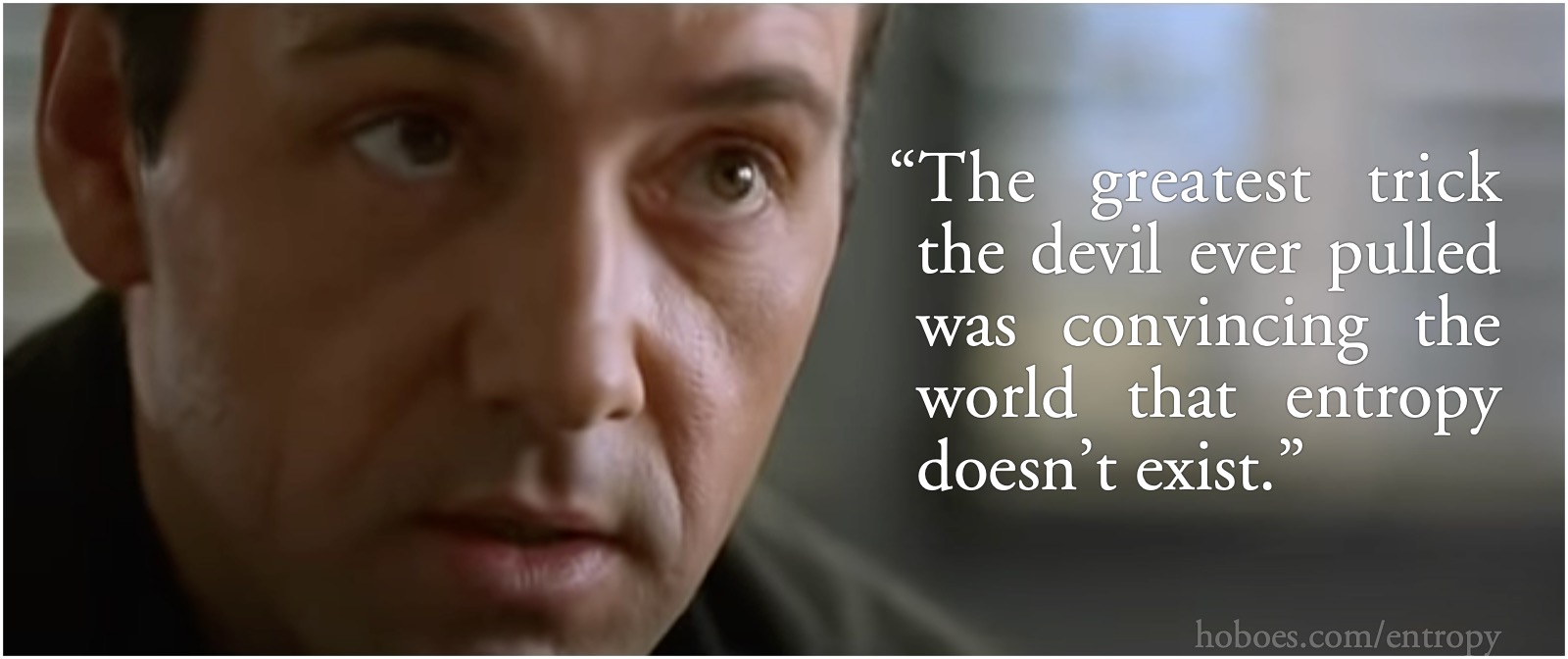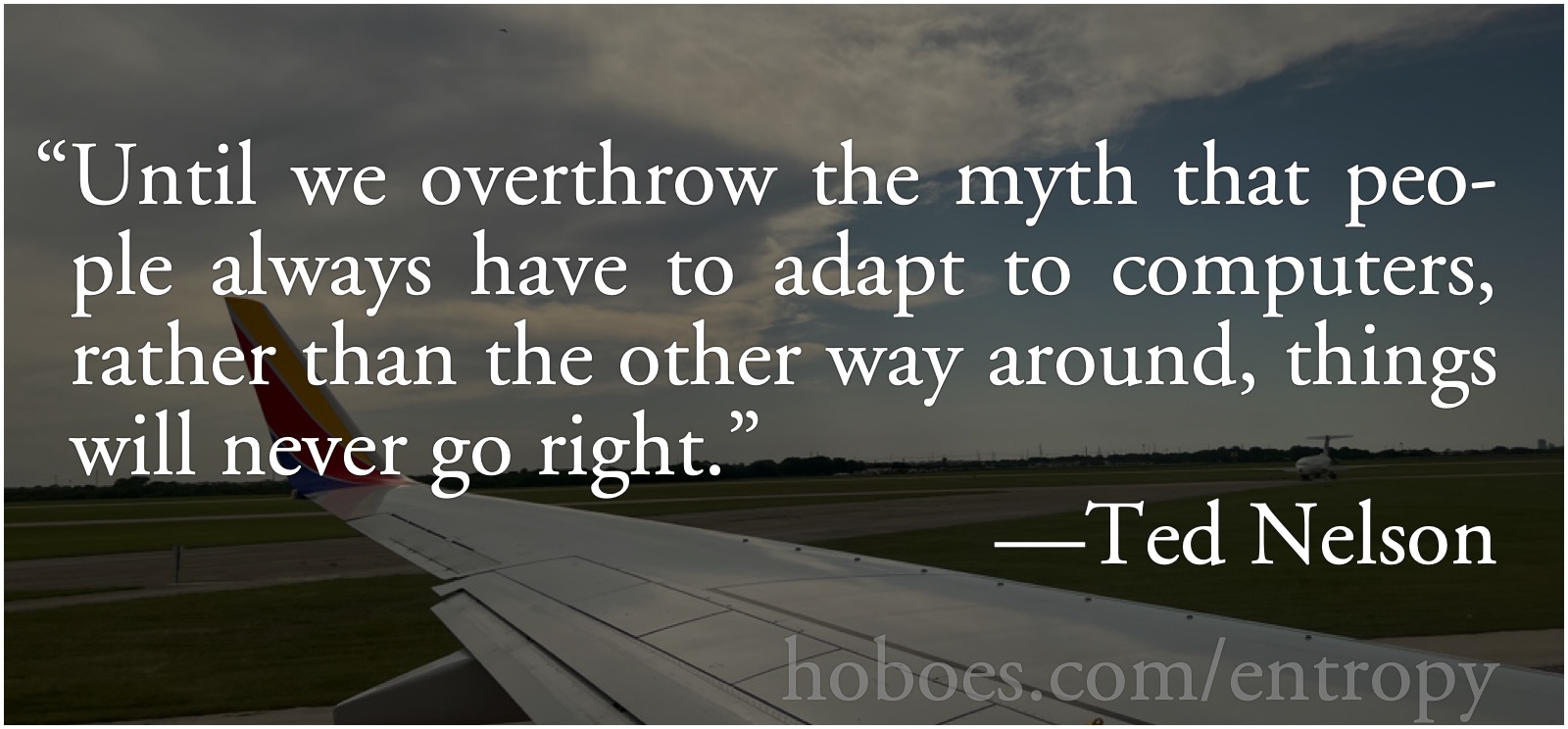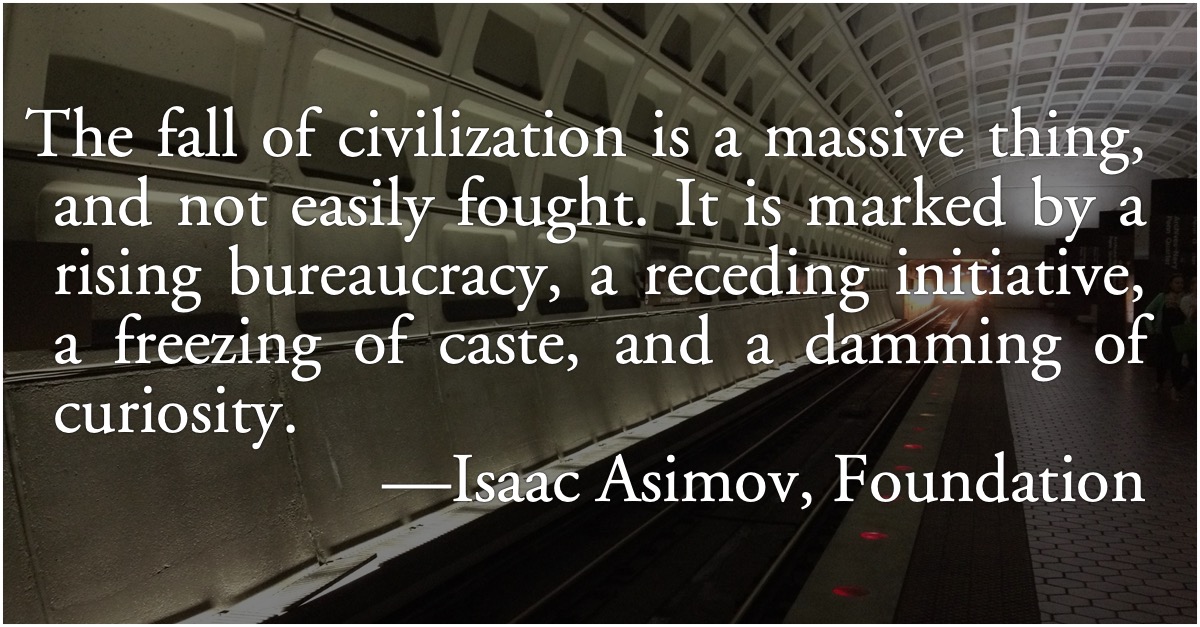Our Cybernetic Future 2023: Entropy in Action

When I was growing up, a standard response taught by parents to young children was “sticks and stones may break my bones, but names will never hurt me.”
I doubt parents still teach that. There are a lot of assumptions in that advice that are no longer safe, notably that it won’t be taken as a challenge. The assumption then was that verbal exchanges remained verbal exchanges. Nowadays the assumption is that knifing a fellow student in the back is merely standard schoolyard play.
That was seriously said by the West Side Left, back in 2021.
Teenagers have been having fights including fights involving knives for eons. We do not need police to address these situations by showing up to the scene & using a weapon against one of the teenagers.
Their logic in letting kids knife kids would be perfectly understandable to Norbert Wiener. Yes, young teenagers have engaged in deadly fights for eons. It was hard work bringing our culture out of the barbarism of child violence. But there is a growing contingent today that doesn’t just want to ignore that without work we get barbarism, they welcome the slide backward into barbarism, even to the point of supporting kids knifing kids.
Without work, entropy always wins.
In part one, I highlighted John G. Kemeny’s argument that the proper relationship between man and machine in the age of the computer is a collaborative one with man in control. In part two I examined Vannevar Bush’s prescient vision of a networked future in which scientific discoveries would be readily available to all, ensuring that science and technology would always advance to the benefit of mankind rather than being lost in dusty libraries. And in part three I added Norbert Wiener’s warnings that entropy applies to communications—especially networked communications—just as it applies to physics.
What can we learn from these three visionaries more than half a century on?
Communications take place temporally as well as spatially. Entropy in communications, then, degrades communication across generations as well as across space. What C.S. Lewis said about education—“This very obvious fact—that each generation is taught by an earlier generation—must be kept very firmly in mind… The moment we forget this we begin to talk nonsense about education.”—is another way of wording that truth.

In technical terms, Lewis realized that education is a signal, passed from generation to generation. Like all such communications it is easily disrupted. Once disrupted, it is difficult to restore the original meaning of the signal.
And we’re not doing well in education. Schools have become battlegrounds for the abuse of children. They are places where, instead of teaching children to become adults, children are given chemicals to block their passing puberty at all. Some are even physically and irreversibly mutilated.
If you want to see the face of entropy, you can see it in the 25-year old child permanently disabled at the behest of their school counselor all for peer pressure from peers who are long gone from their lives.
Our schools teach racism and call it anti-racism, they teach fascism and call it anti-fascism. Teachers admonish children not to tell any responsible adult about the racism and grooming performed in their classrooms. These once-classic signs of exploitation are now accepted as standard practice by many school administrators and teachers.
Entropy at our most vulnerable: children at the hands of their teachers. We are destroying children’s futures, psychologically, physically, and culturally.
Social media isn’t new. We’ve had something like it for as long as we’ve had FAX machines, telephone party lines, automobiles, the printing press, and horses. The use of computers to divide us into groups, guess at our preferences, and even force us into life choices we might not want is a new technology applied to a very old tragedy.
Where once “Paul is dead” might run through a small subculture, modern technology disconnected from responsibility means that dangerous crazes can flash through the entire country.
John Kemeny recognized that the more dependent we become on arbitrary, faceless computer technology, the more we succumb to entropy. The benefit of BASIC wasn’t easy programming (BASIC wasn’t easy) nor coding style (BASIC had none). The benefit of BASIC was an ethos that said, the computer is a partner, a living thing. We can bring that back without bringing back a 50-year-old programming language. We must be taught how to work with computers, not how to obey them.
As I write this, Southwest Airlines has been having trouble with the programs they’ve written for their computers. This has resulted in customers receiving multiple refunds for canceled flights. As written, the system only allows three payments per transaction. Each refund is its own payment code. A customer made the very reasonable request that they be able to either combine funds or use more than three payments. Southwest’s response:

In other words, the rise of entropy.
Regrettably, this is a system limitation, and there isn’t a way around this. The reservation system can only accept up to three forms of payment. You can always book your outbound and return separately to use additional funds.
This is not a system limitation. It is a Southwest Airlines limitation, both in the way they handle refunds and in the way they handle payments. Devolving responsibility to amorphous computers and forcing people to work around them is unacceptable—and we should know enough about computers to know it is unacceptable and treat it as unacceptable.
The same ethos must extend throughout our culture, from politics to education. We are failing to remember the fundamental lessons that entropy has taught us since the birth of man. Norbert Wiener’s “new” addition to the scientific method, a foundational faith in natural processes, would have seemed unimportant ten years earlier, something everyone who needed to know it already knew. Weiner realized that not only was that faith being lost, but in the act of connecting more and more people that foundation would be more and more undermined.
He recognized that the more connected we become the more superstitious and capricious we become.
Vannevar Bush saw the potential to be able to search vast records so that no longer would “truly significant attainments become lost in the mass of the inconsequential”. Norbert Wiener saw the potential for faster communications to foster the rise of a class devoted solely to communications for the sake of communicating babble. Which, of course, meant that entropy wins: truly significant ideas are still lost “in the mass of the inconsequential.”
They’re often ridiculed by the inconsequential. Up until recently, that’s all Twitter was, a forum for mass ridicule.
Vannevar Bush’s essay came at the tail end of World War II. The atomic bomb had not yet been dropped, but we had already achieved victory in Europe. It’s hard to say how much of his optimism was due to the United States coming off of that high. There was after all still a slog of a war going on in the Pacific. And as the director of the Office of Scientific Research and Development he would have known about the as-yet-unused atomic bomb.
By 1954, however, we were living under the threat of nuclear war, which likely influenced Wiener’s ideas about entropy and secrecy. The official policy of mutual assured destruction1 weaponized entropy, and entropy is a very dangerous weapon to wield. That may have helped Wiener recognize what Bush didn’t.
Bush could be confident that what must be solved will be solved because he lived in a scientific culture that valued the scientific method, cause and effect, and objective, rational thinking. Ten years later, Wiener could see that government funding of science projects and a growing emphasis on outcomes rather than opportunity was beginning to break that culture. Cause and effect had been traded out for cargo-cult wishful thinking.
Bush should have known better: the myth of progress has been embraced by the intelligentsia since before the First World War. It was one of the causes of the war. Because no one believed in entropy, no one believed future wars could be that brutal. And so the Gods of the Copybook Headings with terror and slaughter returned.
“There are some mistakes,” C.S. Lewis wrote in The Funeral of a Great Myth, “which humanity has made and repented so often that there is now really no excuse for making them again.”
One of these is the Myth of Progress.
To those brought up in the Myth, nothing seems more normal, more natural, more plausible, than that chaos should turn into order, death into life, ignorance into knowledge… It is one of the most moving and satisfying world dramas which have ever been imagined.
The Myth is also extremely anti-scientific and anti-historical. Science says that entropy exists in nature; history says that entropy exists in human culture. Look at photos of Iran in the sixties. Afghanistan in the seventies. Egypt in the fifties. There were still problems in each of those countries, but the people in those photographs thought that their country was on an inevitable upward incline of civilization. Had you shown them photographs of the streets of now-modern Iran, Afghanistan, or Egypt they would have taken you for a paranoid.
But the incline of civilization is not inevitable except downward, and the lucky in those photographs, women especially, were those who escaped to western countries. Even Egypt, long the star of the Middle East, the cradle of civilization since before recorded history, is no longer safe for men and especially women who want to live in a civilized world.
But then, neither is Rotherham, England, or Toronto, Canada•.
Too many escaped the growing barbarism of the Middle East only to find that western countries encourage the same barbarism here, as “just their culture”. Too many today find themselves trapped in middle-east style barbarism in the midst of civilization. Genital mutilation, brutal, life-threatening abuse of women. Today’s enlightened bigots force these on the vulnerable in what they see as lesser cultures that can’t be expected to value civilization.
Even the most heinous of barbarisms, the murder of children by their parents. On New Year’s Day, 2008, Yaser Abdel Said murdered his two daughters in Irving, Texas. Much is made about the precautions he and his friends took to avoid capture for more than a decade. The fact is no one was looking too hard for him. Six years after the murders, he was added to the FBI’s most-wanted list and a reward offered. Three years after that they bungled an arrest. It took another three years to capture him in nearby Justin, Texas. He’d never even left the area.
Imagine the murder of two young women by their father from a culture we expect civilization of. There would have been nonstop media coverage until the father’s conviction. Instead, “it’s just their culture”. That’s what the judge in Yasmine Mohammed’s• abuse case said. We can’t expect lesser cultures to live up to the ideals of civilization. It would be insensitive.
As I write this, we just went through an election. Voting systems fell apart in major cities throughout the United States, in Maricopa County and in Harris County nearest to hand. Some people say it’s fraud; some people say it’s incompetence. Who knows? But it is an example of entropy at work degrading democracy.
Incompetence, after all, encourages fraud. And after reading Wiener, it looks a whole lot like entropy—as does our response to it, and especially the response of the media.
The media describes every such claim, if it gets mentioned at all, as untrue, wild, and conspiratorial. Any reporter acknowledging fraud is fired—and so few do. But there has always been fraud in American elections. Fraud is entropy just as incompetence is. Sometimes, as in the days of Boss Tweed, Huey Long, Tom Pendergast, Richard Daley, and so on, fraud overwhelmed the system for a time. But we always overcame it. That’s because, even in the worst days of Boss Tweed or the Daley machine, people addressed the existence of fraud rather than deny it.
When we require that everyone pretend that fraud has magically disappeared, we guarantee entropy an upper hand, just as we guaranteed the carnage of the first World War.
Simple systems are less prone to entropy; complexity enables it. Simple systems are less prone to fraud. Complexity enables it. It’s the same thing.
The more people trust a system implicitly, whether it be computer systems or voting systems, the more susceptible to entropy those systems become, because their mistakes are allowed to spread.
Unless we take active measures to detect and to counter fraud, fraud will degrade our democracy just as different paths of entropy degraded Afghanistan, Iran, and Egypt. The paths may be different but the degradation, the barbarism, is the same. Entropy increases through many paths. There is only one path to reducing entropy: constant work. And work begins with an acknowledgement that entropy exists.
Voting is a signal. Fraud disrupts that signal. It is an increase in entropy. We have always had fraud; we have always aspired to better. By pretending we don’t have fraud, we’ve stopped aspiring.
Entropy requires work to overcome. We must always work to end fraud.
Education is a signal. Voting is a signal. Commerce is a signal. Culture is a signal. All are subject to the entropy that Norbert Wiener feared.
In education, in democracy, in commerce, and in culture, we’re allowing entropy to bankrupt us, in the words of Hemingway, “gradually, then suddenly.”
I’ve fallen prey to the Myth of Progress, too. As C.S. Lewis said, it is a very tempting myth. All we have to do is look at history and statistics, and ignore all the hard work that went into making that history happen. Or denigrate that hard work as racist and insensitive. And, boom!, there’s the positive curve of progress. But there is no curve to progress. There is only the hard slog up, or the bloody, bumpy slide down.
If we want the world that Vannevar Bush envisioned, a world where the free flow of information ensures that unrecognized great ideas reach the visionaries with the drive and the freedom to turn those ideas into reality, we must continually work to keep that world real.
A world where ideas are not suppressed. Where new businesses are encouraged. Where small startups are not strangled in bureaucracy and woke. Where the forces of entropy are recognized as the anti-human evils they are.
In response to Our Cybernetic Future 1972: Man and Machine: In 1972, John G. Kemeny envisioned a future where man and computer engaged in a two-way dialogue. It was a future where individual citizens and consumers were neither slaves nor resources to be mined.
The term “MAD” wouldn’t be coined until several years later, but the policy was already in place.
↑
elections
- Boss
- From 1955 to 1976, Richard J. Daley was the mayor of Chicago and the undisputed boss of Chicago politics. In 1971, reporter Mike Royko published a book about Daley’s rise to power and his firm grip on it. Boss is a fascinating story of the Chicago machine that still in some form exists today.
- Maricopa or Die: Jack Gleason at American Thinker
- “Why is the standard for proving election fraud so high? ‘You must prove in a court of law that enough cheating occurred to flip the results.’ Instead, our Boards of Elections should be able to produce evidence to anyone who asks how they ensured an honest election, including how the ballots were generated, verified, transported, and totaled in front of non-partisan or bi-partisan observers.”
- Voter fraud used to be rampant. Now it’s an anomaly: Erin Blakemore
- “Gone are the days when bribes and voting by voice were commonplace at the polls. Today secret ballots and improved security measures have largely ensured fair outcomes in elections.”
- William “Boss” Tweed and Political Machines
- “One politician discovered how to provide these services and get something in return… He quickly became one of the leading politicians in New York City, and one of the most corrupt.”
futurism
- Cargo Cult Science
- “When you have put a lot of ideas together to make an elaborate theory, you want to make sure, when explaining what it fits, that those things it fits are not just the things that gave you the idea for the theory; but that the finished theory makes something else come out right, in addition.” Richard Feynman’s famous “cargo cult science”, adapted from the Caltech commencement address given in 1974. Rescued from Donald Simanek’s home page.
- Christian Reflections: C.S. Lewis at Internet Archive (ebook)
- Several essays on Christianity and modern culture.
- Comfort and Safety: Sarah Hoyt at According To Hoyt
- “The problem is like disabling the fire alarm, it does nothing to prevent fires. In fact it makes it more likely that a fire will happen, because no one is taking the most elementary precautions.” “…they’re honestly convinced if things are never mentioned they won’t exist.”
- The Gods of the Copybook Headings: Rudyard Kipling
-
 We were living in trees when they met us. They showed us each in turn
That Water would certainly wet us, as Fire would certainly burn:
But we found them lacking in Uplift, Vision and Breadth of Mind,
So we left them to teach the Gorillas while we followed the March of Mankind.
We were living in trees when they met us. They showed us each in turn
That Water would certainly wet us, as Fire would certainly burn:
But we found them lacking in Uplift, Vision and Breadth of Mind,
So we left them to teach the Gorillas while we followed the March of Mankind.
- Should we be pessimistic about good governance going into 2016?
- As we head into the final year of President Obama’s presidency, and a new election year, it may help to look into the past for guidance.
Past Civilizations
- Incredible scenes of women’s mini-skirt liberation in 1970s Afghanistan: Paula Froelich at The New York Post
- https://nypost.com/2021/09/11/incredible-scenes-of-womens-liberation-in-1970s-afghanistan/
- Old Egypt: Na El
- “Alexandria in the fifties of the last century.”
- People of Iran: Nevit Dilmen at Wikimedia Commons
- People of Iran in the 1950s, family album of Nevit Dilmen.
More Future Snark
- Future Snark
- Why does the past get the future wrong? More specifically, why do expert predictions always seem to be “hand your lives over to technocrats or we’ll all die?”
- Our Cybernetic Future 1972: Man and Machine
- In 1972, John G. Kemeny envisioned a future where man and computer engaged in a two-way dialogue. It was a future where individual citizens and consumers were neither slaves nor resources to be mined.
- Our Cybernetic Future 1945: As We May Blog
- As we go back in time for insight into the future, actual hardware recedes and the relationship between man and hardware comes to the fore. In 1945, Vannevar Bush laid out a vision of the Internet and desktop computers filled with the knowledge of mankind. And he recognized that this would not merely change how quickly we think, but how we think.
- Our Cybernetic Future 1954: Entropy and Anti-Entropy
- In 1954, Norbert Wiener warned us about Twitter and other forms of social media, about the breakdown of the scientific method, and about the government funding capture of scientific progress.
More John G. Kemeny
- Our Cybernetic Future 1972: Man and Machine
- In 1972, John G. Kemeny envisioned a future where man and computer engaged in a two-way dialogue. It was a future where individual citizens and consumers were neither slaves nor resources to be mined.
More New Barbarism
- Innovation in a state of fear: the unintended? consequences of political correctness
- Is political correctness poised to literally kill minorities as it may already have killed women, because scientists avoid critical research in order to avoid social media mobs?
- Barbarism and the Global Village
- If we don’t protect our borders, we don’t protect our civilization. When Rome let the barbarians in, they became barbarians.
- Money Changes Everything: Empowering the vicious
- Barbarism empowers the rich, the powerful, the vicious, the strong. Civilization empowers everyone else. Gun control and centralized economies, darlings of the progressive left, have empowered the vicious since the beginning of time. The beltway crowd prefers no competition from people free to barter, or free to defend themselves.
- The new barbarism: A return to feudalism
- The progressive left seems to have no concept of what civilization is, and of what undergirds civilization.
- Science by consensus is barbarism
- The scientific method is pure, distilled civilization. It is completely unnatural.
- 16 more pages with the topic New Barbarism, and other related pages
More Norbert Wiener
- Our Cybernetic Future 1954: Entropy and Anti-Entropy
- In 1954, Norbert Wiener warned us about Twitter and other forms of social media, about the breakdown of the scientific method, and about the government funding capture of scientific progress.
More Vannevar Bush
- Our Cybernetic Future 1945: As We May Blog
- As we go back in time for insight into the future, actual hardware recedes and the relationship between man and hardware comes to the fore. In 1945, Vannevar Bush laid out a vision of the Internet and desktop computers filled with the knowledge of mankind. And he recognized that this would not merely change how quickly we think, but how we think.




